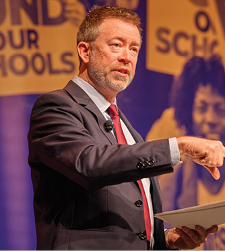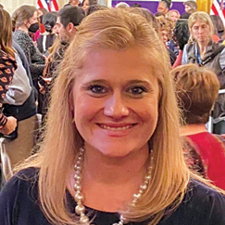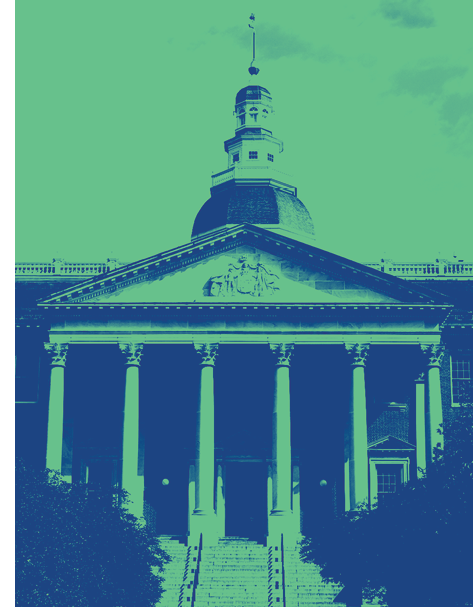The General Assembly
MSEA’s 2025 Legislative Agenda

“The state is facing serious budget challenges going into the 2025 Legislative Assembly. We don’t yet know what threats from the new federal administration might have a uniquely disproportionate effect on Maryland’s economy, such as the possible loss of federal jobs (which employ 160,000 Maryland residents), federal funding for the Key Bridge and Baltimore’s new Red Line, and the planned FBI headquarters move to Greenbelt and the jobs and economic boost it promises. Gov. Moore and our legislature are going to have many tough budget conversations, but they all must include meaningful revenue reform to ensure that corporations and the wealthiest Marylanders pay their fair share. In the face of an uncertain future, we must not balance the state’s budget on the backs of students, working people, and their communities.” —PAUL LEMLE, MSEA PRESIDENT
MSEA’S 2025 LEGISLATIVE PRIORITIES

“Our 2025 legislative priorities focus on ensuring that the state lives up to its commitments to our public schools and the staffing, funding, policies, and resources that they need and deserve to be successful,” says Chrystie Crawford-Smick, chair of MSEA’s Legislative and Citizenship Committee and president of the Harford County Education Association. “Even through hard budget times, we must strive to fund the promises of the Blueprint, attract and retain great educators and support staff, support the ESP Bill of Rights, and improve school safety,” adds Crawford-Smick. “Maryland students must be set up for the long-term success that contributes to the strength and stability of every Maryland community.”

Keeping and Funding Our Commitment to Public Education
Our public schools and public services can only be successful with sufficient resources to serve communities. Yet for decades, wealthy corporations have manipulated the rules to avoid paying taxes, placing the financial burden for the things we care about—our schools, health care, and public safety—disproportionately on working Marylanders.
It’s time to make the wealthiest 1% and big corporations pay their fair share. In the current tax code Maryland gives away millions in business tax breaks, despite overwhelming evidence that they do nothing to boost our economy. In the face of budget challenges, we should eliminate loopholes and tax breaks that benefit special interests and fix our upside-down tax code, which allows the wealthiest individuals to pay the smallest share of their income in state and local taxes. The state must also give local governments the ability to raise additional revenue while also lessening the burden on working people, such as by allowing for variability in the application of property tax to the benefit of working- and middle-class families.

Addressing the Educator Shortage, Retention, and Workload
Maryland’s educator and support staff shortages remain at crisis levels. While the legislature and governor have made progress on this front in the last few years, the pipeline of educators continues to be insufficient due to challenging working conditions and years of inadequate pay. We must continue to take steps to reduce excessive workload to ensure that we retain our education workforce while making the profession more desirable and attainable.

Improving School Safety and Climate
We know that since the pandemic, schools have witnessed an increase in conduct that makes for challenging learning and working environments for students and staff. The answer to these challenges is not to go back to a punitive disciplinary approach that feeds the school-to-prison pipeline. Maryland must maintain its commitment to a broad implementation of restorative practices, more mental and behavioral health services for students, more emphasis on proactively creating working and learning environments free from violence, and more community school models of support services for students and communities. Local school systems also must ensure learning environments are free from the distraction and disruption of smart phones and smart watches. The mental well-being of students and their academic success is placed at risk when learning environments are subjected to frequent interference from electronic devices and social conflict that may arise from the use of social media during the school day.

Holistically Measuring School Success
We know the shortcomings and negative ripple effects of an overwhelming focus on mandated standardized testing. In recent years, we have successfully advocated for more balanced school quality indicators that consider school climate and a well-rounded curriculum in addition to standardized test scores, plus guidelines to minimize the impact of testing on learning time.
This year, MSDE convened the Task Force on School Assessment and Accountability to review Maryland’s school accountability system, with initial recommendations due this month. We will continue to advocate for measures of school success that reflect students’ overall experience rather than a simplistic focus on test scores that narrows curriculum, student opportunities, and the joy of learning.

MSEA’s ESP Bill of Rights

Education support professionals (ESPs) are essential to the success of our schools. The goals of the Blueprint can’t be fulfilled without a high-quality workforce of diverse support staff.
We need to do more to ensure that a living wage, secure future, and strong voice is achievable for these employees. This includes passing a minimum starting wage. ESPs should also be on decision-making bodies about education policy including the Maryland State Board of Education, which notably lacks the unique perspective of a non-supervisory, non-certificated support staff.
“As instrumental members of our school communities, we need a seat on the state board. This is part of our strategy of advocating for and implementing the ESP Bill of Rights through organizing, bargaining, and legislation. While we continue with determination to bargain for a living wage in our locals, we will now, with equal determination, bring that discussion to Annapolis,” says Ivory Smith, president of the Worcester County Education Support Personnel Association and the 2023 MSEA ESP of the Year.


Protecting Our Freedoms
The new administration in Washington has the potential to undercut a wide range of policies that our union, public schools, and students have long depended upon. We’ll support proactive measures to protect our freedoms and our students including: preventing destructive mass deportations; ensuring access to health care, including comprehensive reproductive and gender-affirming care; stopping any expansion of voucher programs; protecting our democracy and elections; ensuring that public and private employees have the right to collectively bargain, and opposing the massive funding cuts and loss of anti-discrimination protections that would result if the U.S. Department of Education shut down.
“It’s important that we do everything we can to try to protect the freedoms of our members and students from any threats posed by the new federal administration. The most vulnerable Marylanders are depending on this work with the governor, our allies in the legislature, and coalition partners,” says Kristina Korona, member of the Legislative and Citizenship Committee and president of the Teachers Association of Anne Arundel County.

